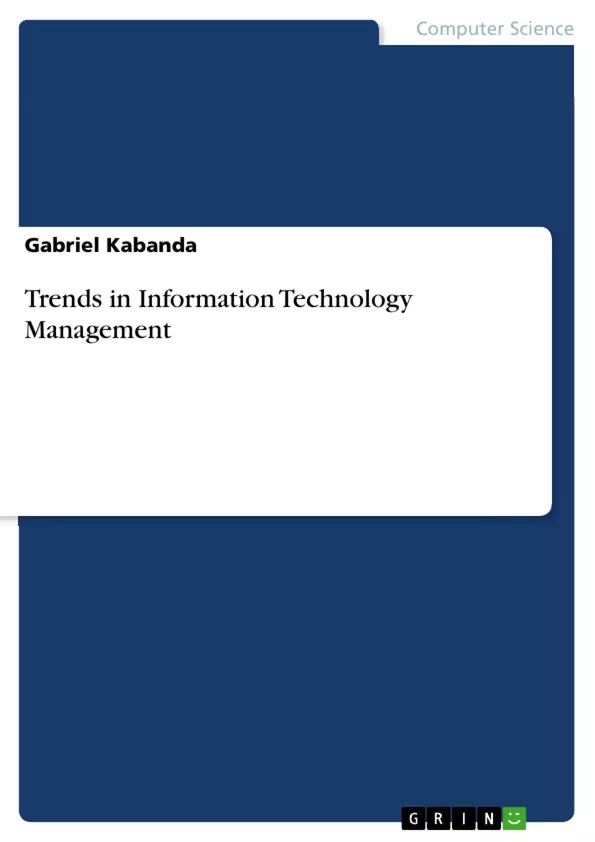The paper presents an analytical exposition, critical context and integrative conclusion on the trends and best practices in Information Technology Management, and reviews and evaluates the key issues, trends and future direction of Modern Information Technology Management. IT is generally accepted as a key enabler of economic and technological growth.
Managers implement new technology to change something: the organization, the nature of work, relationships with other organizations, or some other facet of business. Information Technology (IT) plays a vital role in leveraging productivity and efficiency in private organizations, governments and research. The value of IT in any organization depends on its infrastructure, which consists of computers, network and telecommunication technologies, data and core software applications. Information Technology (IT) is now a force and driver of modern technological development and globalization, and makes the management of information more efficient and effective. Technology management entails all management activities that determine the application of policy, objectives and responsibilities as well as their execution in an organization in terms of planning, allocating resources, organizing and ensuring outcomes that improve processes. The major IT Management issues are: Using technology to design efficient and effective organizations; Developing a plan for information technology in the organization; Using IT as a part of corporate strategy; Taking advantage of interorganizational systems; Deciding on and developing new applications of IT; Reengineering business processes; Adopting special applications; Changing the organization; Managing the IT infrastructure in a time of explosive growth and technological change; Deciding whether and what to outsource; and Deciding how much to invest in IT. Knowledge and skills are a necessary and sufficient condition for technological progress.
Developing countries lack enough skilled IT persons who can design, program, install, configure and maintain Information Technology in this constantly changing industry. Accordingly, lack of qualified and globally recognized IT professionals is seriously hampering IT adoption and development. Management Information Systems refer to information management methods tied to the automation or support of human decision making, whereas IT Management refers to the IT related management activities in organizations.
Inhaltsverzeichnis (Table of Contents)
- ANALYTICAL EXPOSITION
- CRITICAL CONTEXT
- INTEGRATIVE CONCLUSION
Zielsetzung und Themenschwerpunkte (Objectives and Key Themes)
This paper offers an in-depth analysis of the trends and best practices in Information Technology Management. It examines the key issues, trends, and future direction of Modern Information Technology Management. The paper emphasizes the significant role of IT in driving economic and technological growth, particularly in the context of globalization and the changing business landscape.
- The impact of Information Technology (IT) on business operations and organizational change.
- The importance of managing IT infrastructure effectively in a rapidly evolving technological environment.
- The challenges and opportunities associated with the adoption and development of IT in developing countries.
- The role of knowledge and skills in driving technological progress and achieving effective technological capability.
- The relationship between technology and wealth creation, and the principles of socio-economic order that influence its impact.
Zusammenfassung der Kapitel (Chapter Summaries)
- ANALYTICAL EXPOSITION: This chapter presents an overview of the trends and best practices in Information Technology Management. It explores how the introduction of computers and communication technologies has transformed organizational behavior and business practices. The chapter highlights the vital role of IT in driving global socio-economic transformation and its impact on competitiveness.
- CRITICAL CONTEXT: This chapter delves deeper into the challenges and opportunities presented by the rapid development of IT. It discusses the importance of a theoretical framework for technology management to avoid being overwhelmed by technological advancements. The chapter also emphasizes the need for managers to have a strong understanding of technology and its potential applications in corporate strategy.
Schlüsselwörter (Keywords)
The main keywords and focus topics of this paper include Information Technology Management, technological trends, globalization, business transformation, organizational change, IT infrastructure management, technological capability, knowledge and skills, developing countries, and socio-economic order.
Frequently Asked Questions
What is the difference between MIS and IT Management?
Management Information Systems (MIS) refer to methods tied to automating human decision making, while IT Management refers to all IT-related management activities within an organization.
What are the major issues in modern IT Management?
Key issues include using IT for corporate strategy, reengineering business processes, managing infrastructure during explosive growth, and deciding what to outsource.
How does IT impact organizational change?
Managers implement new technology to change the nature of work, organizational structures, and relationships with other entities to improve efficiency.
What challenges do developing countries face regarding IT?
Developing countries often lack enough skilled professionals to design, install, and maintain IT systems, which hampers adoption and progress.
What constitutes an organization's IT infrastructure?
It consists of computers, network and telecommunication technologies, data, and core software applications.
- Quote paper
- Professor Gabriel Kabanda (Author), 2019, Trends in Information Technology Management, Munich, GRIN Verlag, https://www.grin.com/document/491408



